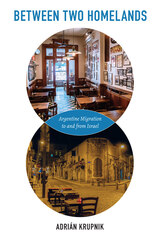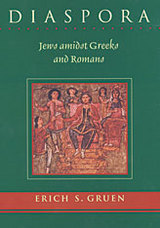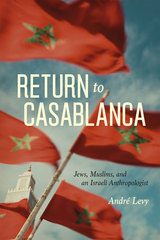
Emigration from Israel to other parts of the world has not yet received significant scholarly attention, as the subject is a sensitive one in Israeli society. Zionist ideology has long compelled Israelis to approach emigration from Israel through a biased lens. The Hebrew words aliyah and yerida, which mean, respectively, “ascent” and “descent,” are often used to refer to immigration and emigration. These ideological terms, which are charged with religious meaning, are heavily loaded with praise for immigrants and scorn for emigrants. Yet, thousands of Jews from all over the world have lived between two homelands, as the Israeli-Argentine case demonstrates. This study challenges the formerly dominant Zionist narrative that presents immigration to Israel as unique and emigration as a disgrace, shedding light on issues of immigrant identities, belonging, and expectations.
Covering the better part of the twentieth century and extending into the twenty-first, Adrián Krupnik bases his study both on interviews and on archival documents in English, Spanish, and Hebrew to give voice to Argentine migrants to and from Israel. The pursuit of two often irreconcilable ways of living—peace and economic prosperity—repeatedly vexed migrants moving in either direction. Many Jewish-Argentine migrants between 1980 and 2006 lost everything and became the “new poor” in both countries. Protracted recessions and incessant political crises in Argentina continued to drive migrants in one direction, only to arrive in an Israel submerged in the violence of multiple intifadas.
In our own era, one that will see unprecedented global migration patterns based on similar economic and political—and environmental—upheavals, Between Two Homelands serves as an important and informative cautionary tale of the personal, social, and economic stakes at play in an utterly unsettled globalized landscape.

What was life like for Jews settled throughout the Mediterranean world of Classical antiquity--and what place did Jewish communities have in the diverse civilization dominated by Greeks and Romans? In a probing account of the Jewish diaspora in the four centuries from Alexander the Great's conquest of the Near East to the Roman destruction of the Jewish Temple in 70 C.E., Erich Gruen reaches often surprising conclusions.
By the first century of our era, Jews living abroad far outnumbered those living in Palestine and had done so for generations. Substantial Jewish communities were found throughout the Greek mainland and Aegean islands, Asia Minor, the Tigris-Euphrates valley, Egypt, and Italy. Focusing especially on Alexandria, Greek cities in Asia Minor, and Rome, Gruen explores the lives of these Jews: the obstacles they encountered, the institutions they established, and their strategies for adjustment. He also delves into Jewish writing in this period, teasing out how Jews in the diaspora saw themselves. There emerges a picture of a Jewish minority that was at home in Greco-Roman cities: subject to only sporadic harassment; its intellectuals immersed in Greco-Roman culture while refashioning it for their own purposes; exhibiting little sign of insecurity in an alien society; and demonstrating both a respect for the Holy Land and a commitment to the local community and Gentile government. Gruen's innovative analysis of the historical and literary record alters our understanding of the way this vibrant minority culture engaged with the dominant Classical civilization.

As a renowned academic, orator, and activist, Shohat’s work unpacks complexly fraught issues: anomalies of the national and colonial in Zionist discourse; narrating of Jewish pasts in Muslim spaces; links and distinctions between the expulsion of Palestinians during the 1948 war and the dislocation of Arab-Jews; traumatic memories triggered by partition and border-crossing; echoes within Islamophobia of the anti-Semitic figure of the Jew; and efforts to imagine a possible united and peaceful future. Shohat’s trans-disciplinary perspective illuminates the contemporary cultural politics in and around the Middle East. A transdisciplinary work engaging history, literature, sociology, film, media, and cultural studies, Selected Writings offers a vivid sense of Shohat’s unique intellectual journey and field-defining career.


Levy visits a host of sites and historical figures to assemble a compelling history of social change, while seamlessly interweaving his study with personal accounts of his returns to his homeland. Central to this story is the massive migration of Jews out of Morocco. Levy traces the institutional and social changes such migrations cause for those who choose to stay, introducing the concept of “contraction” to depict the way Jews deal with the ramifications of their demographic dwindling. Turning his attention outward from Morocco, he goes on to explore the greater complexities of the Jewish diaspora and the essential paradox at the heart of his adventure—leaving Israel to return home.
READERS
Browse our collection.
PUBLISHERS
See BiblioVault's publisher services.
STUDENT SERVICES
Files for college accessibility offices.
UChicago Accessibility Resources
home | accessibility | search | about | contact us
BiblioVault ® 2001 - 2024
The University of Chicago Press









